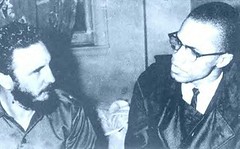
Malcolm X and Fidel Castro in Harlem when the Cuban leader stayed in the African community to protest racism in mid-Mahattan during October of 1960.
Originally uploaded by Pan-African News Wire File Photos
A missed shot on the wrong flank
Pedro de la Hoz
Courtesy of Granma International
THE December 1 edition of Miami’s El Nuevo Herald published a full report on an "African-American Statement in Support of Civil Rights in Cuba," which accuses our country of currently being a racist society, drawing on an alleged increase in civil and human rights abuses of Cuban activists with the courage to raise their voices against the island’s racist system. It stated that "those isolated and courageous defenders of civil rights have been subjected to unprovoked violence, intimidation on the part of the authorities and imprisonment."
The documents had been hastily circulated a few hours before to procure signatures that would give visibility to something cooked up by Carlos Moore, an individual of Cuban origin who, for years now, has presented himself as a "specialist on racial issues" and has made a living in the United States and Brazil at the cost of manipulating Cuban realities. Prior to its publication, Moore had managed to con a respectable activist from the African-Brazilian movement, making him believe that legal action taken by the Cuban authorities against one of the beneficiaries of funds from the anti-Cuba policies of various U.S. administrations, was because the subject is black. He kidded other people who received the statement into believing the same story.
Someone of the prestige of the African-American poet and playwright Amiri Baraka (LeRoi Jones) commented on the communiqué as follows: "Moore has been promoting this type of vicious provocations since the 60s… Apparently certain African Americans who signed his petition are unaware of Moore’s historical pull."
James Early, another outstanding figure who has traveled to Cuba on many occasions and who works in the Smithsonian Institute, stated that he did not trust Moore’s motives for involving himself in the issue of race in Cuba and stressed that "the letter is not in line with what I and other African-American activists found in our recent visit from September 14 to 22, during which we had frank and open conversations with Cuban citizens and government officials." Early also noted that "Cuban citizens and their political representatives are discussing how to improve their socialist revolution."
So eloquent is the letter in the method it uses to distort racial issues, that one of its signatories addressed the media on Monday, December 7. Makani Themba-Nixon, director of the Praxis Project, asked for his name to be withdrawn from the documents, on the grounds that the accusatory letter against Cuba "is being manipulated to help to detract legitimacy from the important social project that is underway in that nation."
A group of Cuban intellectuals, solely directed by our consciences and in a personal capacity, came together to share our point of view on the issue with African-American colleagues. Because this is about airing, in all seriousness and with arguments, human rights in our country, and about making it known that the statement issued in the United States is a missed shot on the wrong flank.
Translated by Granma International
No comments:
Post a Comment